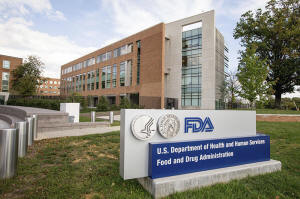FDA moves to rehire medical device, food safety and other staffers fired
days earlier
 Send a link to a friend
Send a link to a friend
 [February 25, 2025]
By MATTHEW PERRONE [February 25, 2025]
By MATTHEW PERRONE
WASHINGTON (AP) — Barely a week after mass firings at the Food and Drug
Administration, some probationary staffers received unexpected news over
the weekend: The government wants them back.
Beginning Friday night, FDA employees overseeing medical devices, food
ingredients and other key areas received calls and emails notifying them
that their recent terminations had been “rescinded effective
immediately,” according to messages viewed by The Associated Press.
Four FDA staffers impacted by the decisions spoke with the AP on
condition of anonymity because they planned to continue working for the
agency and weren’t authorized to discuss its internal procedures.
The reversal is the latest example of President Donald Trump and
billionaire Elon Musk's chaotic approach to cost-cutting, which has
resulted in several agencies firing, and then scrambling to rehire,
employees responsible for nuclear weapons, national parks and other
government services.
The FDA reinstatements followed pushback by lobbyists for the medical
device industry, which pays the agency hundreds of millions of dollars
annually to hire extra scientists to review products. The industry's
leading trade group said Monday “a sizable number” of device reviewers
appear to be returning to FDA.
“This would be welcome news, and I appreciate the administration for
acting quickly,” AdvaMed CEO Scott Whitaker said in an emailed
statement. “We all share the same goal — an efficient, effective FDA
review process that helps advance the medical technologies American
patients depend on.”

FDA staffers said entire teams of five or more medical device reviewers
had been reinstated.
In the agency's food program, at least 10 staffers responsible for
reviewing the safety of new ingredients were offered their jobs back,
according to a food staffer who spoke to the AP on condition of
anonymity to discuss internal agency matters.
The FDA’s deputy commissioner for foods, Jim Jones, resigned last week,
citing “the indiscriminate firing” of nearly 90 staffers in his
division, according to a copy of his resignation letter obtained by the
AP. The food program recently underwent a major restructuring to better
oversee essential products like infant formula and baby food.
The FDA hasn’t released official numbers on the terminations, but former
FDA officials have pegged the number at roughly 700, with more than 220
coming from the medical device center. That would represent roughly 10%
of the program's total staffing.
The FDA did not respond to requests Monday about how many employees were
being reinstated.
Like other agencies, the FDA terminations went to employees in their
probationary period, typically the first two years of federal
employment. But that approach resulted in firings across key areas where
the agency has been working to beef up staffing, including rapidly
evolving fields like artificial intelligence and digital health. The
cuts also included agency leaders who were recently hired for senior
roles.
[to top of second column]
|

The U.S. Food and Drug Administration campus in Silver Spring, Md.,
is photographed on Oct. 14, 2015. (AP Photo/Andrew Harnik, File)
 “The disarray caused by the
wholesale termination of a wide swath of device center staff was
counterproductive and appears to have caused a variety of unintended
and negative results,” said Steve Silverman, a former FDA device
official who now runs a consulting firm. “It’s encouraging to see a
shift in the opposite direction that recognizes the critical
expertise of these staffers.”
Many reviewers have advanced degrees in specialized
medical and technological fields. They can typically earn more in
the private sector than in government.
Last week, the lobbying group AdvaMed pushed back on the firings,
calling on Health Secretary Robert F. Kennedy Jr. to reverse course.
The group warned that the cuts would result in slower approvals for
companies and fewer new treatment options for patients.
“FDA will lose hundreds of new employees, the best and most
innovative hires under our most recent agreement,” Whitaker wrote in
a statement posted online. He noted that the hiring of FDA device
reviewers is largely financed through an ongoing five-year agreement
between the FDA and medical device companies.
More than half the device program’s $791 million budget last year
came from industry fees, according to federal figures. In return,
the FDA is obligated to meet certain benchmarks for quickly and
predictably reviewing applications for new and updated devices.
FDA staffers who were reinstated said their immediate supervisors
received no explanation or advance notice on the decisions. Instead,
staffers received calls or emails from the FDA’s “Office of Talent
Solutions,” informing them that their access to FDA computer systems
and offices had been restored.
“We are so grateful to still have you working for the FDA and
serving the American public!” the emails concluded.
A week earlier, the same employees received emails stating that they
were “not fit for continued employment because your ability,
knowledge and skills do not fit the agency’s current needs.”
Nearly half the FDA’s budget, or about $3.3 billion, comes from fees
paid by drugmakers, device and tobacco companies. The result is that
broad cuts to those programs won’t add much toward Musk’s stated
goal of shrinking the federal budget.
But the financial support of industry fees did not appear to help
staffers in other parts of the agency.
FDA's tobacco center — which reviews new products like electronic
cigarettes and nicotine pouches — is 100% funded by industry fees.
But there did not appear to be an effort to rehire the estimated 100
or so employees fired from that center.
___
AP Health Writer JoNel Aleccia contributed to this story.
All contents © copyright 2025 Associated Press. All rights reserved |